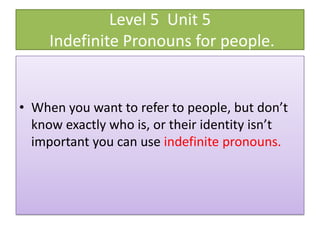Denunciar
Compartilhar

Recomendados
Mais conteúdo relacionado
Mais procurados
Mais procurados (15)
Destaque
Destaque (20)
Indefinite Pronouns and articles/Pronomes e artigos indefinidos

Indefinite Pronouns and articles/Pronomes e artigos indefinidos
Mga pandaigdigang pananaw at ang kaugnayan nito sa daloy ng kasaysayan

Mga pandaigdigang pananaw at ang kaugnayan nito sa daloy ng kasaysayan
Mais de Lorena Chum
Mais de Lorena Chum (10)
Indefinite pronouns explanation
- 1. Level 5 Unit 5 Indefinite Pronouns for people. • When you want to refer to people, but don’t know exactly who is, or their identity isn’t important you can use indefinite pronouns.
- 2. Someone (+) (?) Anyone (-) (?) Each one refers to an unnamed No one (it means person. negative but write in affirmative sentences) Examples: There is someone no one in the classroom. There isn’t anyone ---------------------------------------------------------------------------------------------------------- Is there anyone in the classroom? Is there someone in the classroom?
- 3. EXAMPLES OF AFFIRMATIVE STATEMENTS There’s someone in your house. There’s no one wainting for you. Someone from the office can bring the information. No one is coming for dinner tonight.
- 4. EXAMPLES OF NEGATIVE STATEMENTS • There isn’t anyone at school today. • I don’t see anyone in Andy’s party. • Mike can’t find anyone to fix his house roof.
- 5. EXAMPLES OF QUESTIONS WITH INDEFINITE PRONOUNS • Is there someone at school at midnight? • Can someone come on Sunday? • Did you find someone in your beach trip? • Is there anyone in your bedroom? • Can anyone tell the information to James? • Did you see anyone suspicious in the hotel?
